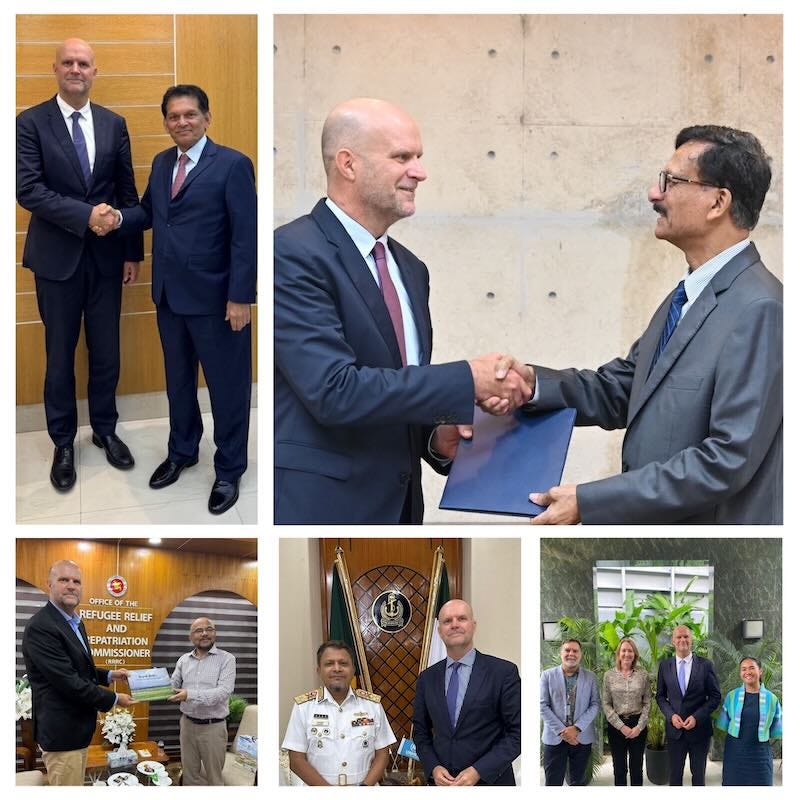Mud, Shoes, and Silence - UNHCR’s New Chief in Bangladesh
When Ivo Freijsen presented his credentials earlier this month as UNHCR’s new representative in Bangladesh, he was quickly ushered into the familiar circuits of humanitarian diplomacy. His X (Twitter) feed is now a cascade of photos with ministers, ambassadors, and senior aid executives - the “great and good” of Dhaka’s humanitarian scene.
Scroll through Freijsen’s X feed and the pattern is unmistakable:
“An engaging and informative discussion with Australian High Commissioner H.E. Susan Ryle…”
“A constructive and substantive initial exchange with National Security Adviser Dr. Khalilur Rahman…”
The words change little - “engaging,” “constructive,” “substantive” - but the choreography remains the same - posed selfies with dignitaries, platitudes about “exploring opportunities together,” and warm thanks to donors for their “steadfast generosity.”

What you won’t find is a single mention of the 400 Rohingya families who slipped him a letter in Nayapara Registered Camp during his visit. UNHCR Bangladesh, however, duly amplified the visit on social media:
“UNHCR Representative @IFreijsen took his very first visit to the Rohingya camps this week, meeting refugees & seeing the work of humanitarian partners firsthand. From protection to infrastructure challenges — he listened, learned & engaged with those shaping the response.”
But the reality was closer to the opposite. For those who matter most - the Rohingya refugees whose lives UNHCR claims to protect - access has been carefully blocked. At Nayapara Registered Camp, residents who refused to surrender their old UNHCR documents for a biometric “re-verification” were prevented from speaking directly to him. They slipped him a typed letter instead via one of his aides. There has been no reply. Since then, further emails have been sent. Again, no reply.
Meanwhile, footage of his refugee camp visit circulated. It showed Freijsen, not engaged with desperate families or wrestling with urgent questions of protection, but staring anxiously at the mud threatening to ruin his running shoes - a pair that looked suspiciously like Asics Nimbus 27s. I could be wrong about the brand…
Video: UNHCR’s new representative carefully navigating the mud.
Western media often remark on the sartorial choices of visiting politicians or dignitaries. In this case, however, the footwear really does tell the story - immaculate trainers while the people Freijsen avoided remain ankle-deep in mud, hunger, and silence.
The letter he ignored was not abstract. It spoke for 400 registered Rohingya families (around 2,000 people) who have now been without food rations, LPG, or basic medical and hygiene supplies for six months. Their refusal to undergo biometrics was not whimsical. As their representative Mohammed Iqbal explained, the new “voluntary” process erases their long-standing UNHCR refugee papers, strips the word “Rohingya” from ID cards, raises the risk of data reaching Myanmar or Bangladeshi security agencies, and recalls earlier episodes when “neutral paperwork” was later weaponised to coerce repatriation.
Here is how one mother, Hasina Begum, put it:
“It has now been five months since our gas supplies were cut, four months since our food rations stopped, and an entire year since we last received soap. We have been forced to leave our shelters to sell small leafy vegetables just to support our children. But even with this effort, we cannot provide enough food. Our children are now suffering from hunger, sickness, and malnutrition. I want to remind the world that we are registered refugees under the United Nations. Our aid and food rations were suspended because we refused to surrender our official UN refugee documents in exchange for a new process called biometrics.”
Another, 75-year-old Zabada Khatun, asked the obvious:
“Even though we chose not to do biometrics, does UNHCR have the right to stop our food and healthcare? How are we supposed to survive?”
UNHCR now concedes what refugees have suspected for months. The biometric ration cuts are mandated by the Government of Bangladesh. Its Inspector General has admitted that UN humanitarians are simply implementing a state directive. The fog of “ration cuts are necessary for programme integrity” is gone. It is Dhaka’s policy carried out with UN logos.
That should change everything. If the government is the policy author, then donors and agencies must press Dhaka, and UNHCR must activate what its own handbook prescribes - alternatives for those who refuse biometrics on legitimate grounds. UNHCR’s Guidance on Registration and Identity Management is explicit:
“Individuals have the right to refuse the collection of their biometrics on legitimate grounds… This does not alter their right to international protection… In such cases, individuals may be registered, and alternative methods identified to ensure they can access rights, assistance and solutions.”
So why did 400 long-registered Rohingya families enter month six without food, gas, soap, or routine medical care? Why were non-biometric alternatives never offered? Why was attrition by hunger allowed to stand in for dialogue?
For all the talk of “programme integrity,” the playbook has been simple: cut rations, wear them down, watch the “numbers …(accepting biometrics)… grow,” and expect compliance. If this isn’t coercion, what is? And if the new UNHCR chief is serious about his mandate, he might start by looking up from his running shoes and answering that question.
